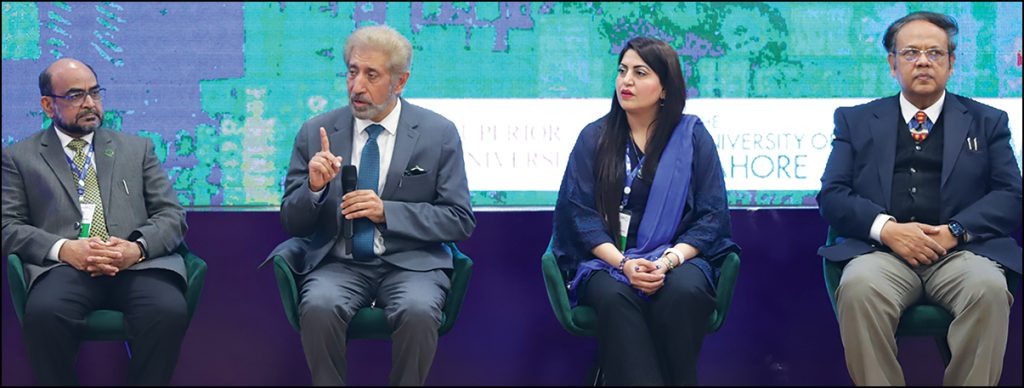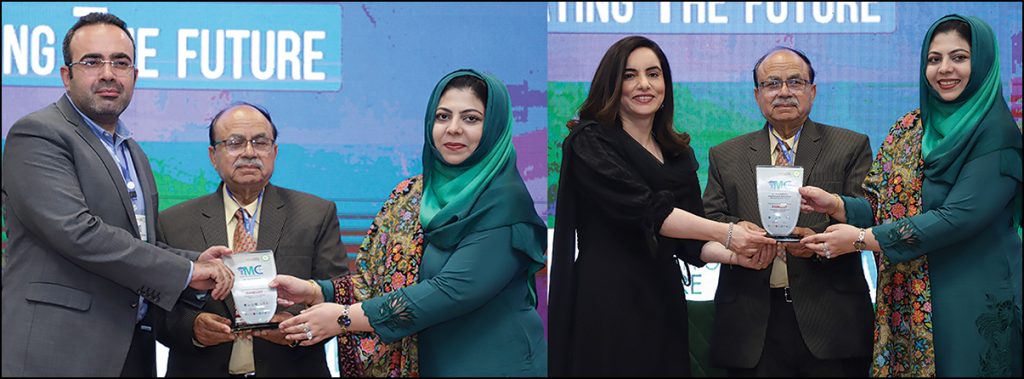It works as bridging between clinicians &
computer technologists – Dr. Jabeen Fayaz
Minimal invasive surgery is painless, safe, ensures early
recovery and one can go back to work quickly – Prof. Mahmood Ayaz
LAHORE: Use of Artificial Intelligence in Healthcare Delivery and Management was discussed by various speakers in the second scientific session of Internaitonal Medical Conference organize by Superior University and University of Lahore in collaboration with PAMI on March 7th 2024.

Prof. Mahmood Ayaz Vice Chancellor KEMU speaking at the second scientific
ses-sion of IMC 2024 organized by Superior University and University of Lahore
in collaboration with PAMI. Other speakers in the session sitting on the dais from
(L to R) are Prof. Muhammad Tariq, Dr. Jabeen Fayaz and Prof. Mughees Baig.
Dr. Jabeen Fayaz from Canada was the first speaker who discussed AI and Healthcare Simulation. She pointed out that simulation can happen everywhere. It is based on integration and collaboration. In fact, it is the use of computer science when developing studies with the intelligence of machines. She discussed in detail AI techniques in simulation including machine learning, natural language processing, computer vision and patient simulation. Hospitals, she said ,are using AI to treat patients. There are challenges and considerations, there are some ethical issues. AI works for bridging between clinicians and computer technologists, she added.
Prof. Mughees Baig from UOL in his presentation “Focus on people: Let AI do the clinical documentation” said that clinicians are all the time struggling with documentation which is a great burden. Studies have showed that clinicians spend almost 33% of their time on documentation, 33% on ordering investigations and only 17% on prescriptions. Most of the time they have no contact with the patient. With increased workload many of them suffer from burnout syndrome with the result that almost 69% of them consider leaving the medical profession. The turnover of Internaitonal Medical Graduates in Unites States costs millions of dollars to the government. In Pakistan almost 50% of clinicians suffer from burnout, have health issues and many consider leaving the profession. We need to reduce physician’s burnout and spend more time with the patient. Enhance the patient’s exposure with clinicians. Use AI for documentation. Now voice to test transcription service is also available and AI can help in advanced diagnoses and treatment planning.

Prof. Mahmood Ayaz Vice Chancellor King Edward Medical University discussed the use of artificial intelligence in minimal invasive surgery. He pointed out that robot’s act on the command of surgeons. He also talked about patient’s expectations and perceptions of surgeons. Minimal invasive surgery is painless, safe, ensures early recovery and one can go back to work quickly. He discussed in detail the robotic evolution in minimal invasive surgery which enables precision dissection. The ability to work in limited closed space is tremendously enhanced. It offers incentives to improve one’s efficiency and also saves the surgeons from some of the complications. Of course all surgeons have their own learning curve in surgical skills and development, he added.

Prof. Abrar Ashraf Ali speaking in the panel discussion on “Creating readiness for
AI in Healthcare Diagnostics, Delivery and Management” during the IMC 2024.
Other panelists sitting on the dais from (L to R) are Prof. Zahid Latif, Mr. Shafiqur
Rehman, Prof. M. Akbar Chaudhry, prof. Farrukh Iqbal and Dr. Duraiz Rehman.
Prof. Muhammad Tariq from Aga Khan University Karachi discussed the role of AI in clinical approach. He highlighted its role in clinical application in diabetic retinopathy, pneumonia, chest radiographs. It is extremely useful in residents training. Chat GPT helps in finding out the most likely diagnosis. He further pointed out that with the passage of time integration of AI in healthcare will improve. At present we have lack of quality data.AI cannot replace humans but can work as good human assistants. During the discussion it was stated that one can always learn use AI tools before going to work on actual patients. Students and Residents are now involved in teaching and training as well as in assessment. Clinical skills are extremely important and they will never go away.
Panel Discussion
Creating readiness for AI in Healthcare Diagnostics, Delivery and Management was discussed in the panel discussion which followed. Members of the Experts panel included Prof. M. Akbar Chaudhry, Prof. Farrukh Iqbal, Prof. Tariq, Mr. Shafiqur Rehman, Prof. Abrar Ashraf, Dr. Duraiz Rehman and Prof. Zahid Latif. The panelists highlighted that Imaging manipulation, triage of the patients by AI and there is lot of ground still to be covered. Regulatory framework for the use of AI is important. There are certain pre-requisites and good documentation is essential. We also need strong regulatory framework. Importance of faculty development programme, train the trainers and the huge cost needed to support this system was also discussed in detail.

Inter sectoral collaboration was also highlighted. All stakeholders, it was further stated, have to work together. One learns the clinical skills after lot of experience. Physical contact with the patient has its own importance. Discussing the ethical concerns, it was stated that the overall responsibility lies with the physicians which is only possible with physical contact. Physicians were advised to use their mind and do not believe Chat GPT what it says. The importance of Professional capacity building was also highlighted.

Prof. Mashwish Arooj along with Prof. M. Akbar Choudhury presenting Mementoes
to Mr. Shafiq ur Rehman from RMI Peshawar and Prof. Marriyah Hidayat
at the concluding session of IMC 2024 held at UOL Lahore.



